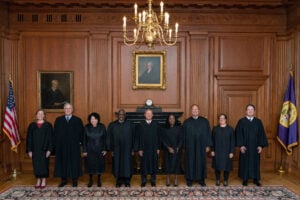Despite Two Constitutional Violations During Trial, A Man Was Sentenced To Die. Will The Supreme Court Act?
Is it really that difficult to only put people to death when you have actual proof that they did the thing?

(Photo by Collection of the Supreme Court of the United States via Getty Images)
If you grew up watching the copaganda that is Law and Order, it wouldn’t be unlikely for you to walk away with a few planted ideas. You may have thought that most murderers get caught; right now, it is at about half. You may also think that given the severity of the death penalty, the people who are subject to it were proven to be murderers beyond a reasonable doubt. That isn’t true, especially in the case of felony murder, as Justice Sonia Sotomayor pointed out, but it also isn’t necessarily the case with normal murder either. To put it simply, naive TV representations tend to leave out the bureaucratic madness and bad lawyering that go into getting potentially innocent people murdered in the name of justice by the state. One example, and a very timely one at that, is the case of Richard Glossip — a man sentenced to death with no real corroborating evidence.
On Monday, Oklahoma Attorney General Gentner Drummond, a Republican, filed a truly remarkable document in the Supreme Court.
“The State of Oklahoma recently made the difficult decision to confess error and support vacating the conviction of Richard Glossip,” the document reads, referring to a death row inmate scheduled to be executed on May 18. But because other parts of the state government don’t agree, and Oklahoma’s attorney general does not have the power to lift Glossip’s death sentence on his own, Drummond is now begging the Supreme Court of the United States to save Glossip’s life.
It’s a bizarre case, where the state’s top prosecutor, who is also the official empowered to speak on behalf of the state in court, can’t actually stop an execution. But he can use the state’s voice to urge the justices to stop that same state from committing a massive injustice.

How Generative AI Will Improve Legal Service Delivery

The circumstances that drew serious doubts about the case against Mr. Glossip aren’t some fluke a la Curb Your Enthusiasm. A Biglaw firm, Reed Smith LLP, played a huge part in combing the record to find what should have been presented at Glossip’s original trial.
The case against Glossip, who was convicted for allegedly hiring a coworker to kill his boss in 1997, now lies in shambles. In 2022, Reed Smith LLP, a law firm commissioned by a committee of state lawmakers, released a 343-page report detailing its investigation into Glossip’s conviction and the many errors that led to Glossip being sentenced to die. Its conclusion is scathing:
The State’s destruction and loss of key evidence before Glossip’s retrial deprived the defense from using the evidence at trial (and has deprived the defense today of the ability to perform forensic testing using DNA and technology advancements), the tunnel‐vision and deficient police investigation, the prosecution’s failure to vet evidence and further distortion of it to fit its flawed narrative, and a cascade of errors and missed opportunities by defense attorneys, fundamentally call into question the fairness of the proceedings and the ultimate reliability of the guilty verdict against Glossip for murder.
This report is bolstered by a separate investigation, conducted at Drummond’s request by Rex Duncan, a former district attorney and Republican state lawmaker. Duncan concluded that “Glossip was deprived of a fair trial in which the State can have confidence in the process and result.”
Our Supreme Court has already displayed nonchalance when it comes to people sentenced to death. Him specifically! In the 2015 case Glossip v. Gross, the Court decided that death penalty by lethal injection using midazolam didn’t constitute cruel and unusual punishment. And as desperate as it is to now depend on that Court to get him off of death row, this time could be different. There are two potential constitutional violations that went unchecked in Glossip’s trial. There are arguments that the process used to find Glossip guilty of murder violated the Brady rule and the Fourteenth Amendment. The Court has up to May 18th to act.
Oklahoma Begs The Supreme Court To Stop It From Killing A Man [Vox]
Sponsored

Early Adopters Of Legal AI Gaining Competitive Edge In Marketplace

Legal AI: 3 Steps Law Firms Should Take Now

How Generative AI Will Improve Legal Service Delivery


Early Adopters Of Legal AI Gaining Competitive Edge In Marketplace
 Chris Williams became a social media manager and assistant editor for Above the Law in June 2021. Prior to joining the staff, he moonlighted as a minor Memelord™ in the Facebook group Law School Memes for Edgy T14s. He endured Missouri long enough to graduate from Washington University in St. Louis School of Law. He is a former boatbuilder who cannot swim, a published author on critical race theory, philosophy, and humor, and has a love for cycling that occasionally annoys his peers. You can reach him by email at cwilliams@abovethelaw.com and by tweet at @WritesForRent.
Chris Williams became a social media manager and assistant editor for Above the Law in June 2021. Prior to joining the staff, he moonlighted as a minor Memelord™ in the Facebook group Law School Memes for Edgy T14s. He endured Missouri long enough to graduate from Washington University in St. Louis School of Law. He is a former boatbuilder who cannot swim, a published author on critical race theory, philosophy, and humor, and has a love for cycling that occasionally annoys his peers. You can reach him by email at cwilliams@abovethelaw.com and by tweet at @WritesForRent.
Sponsored

Navigating Financial Success by Avoiding Common Pitfalls and Maximizing Firm Performance








